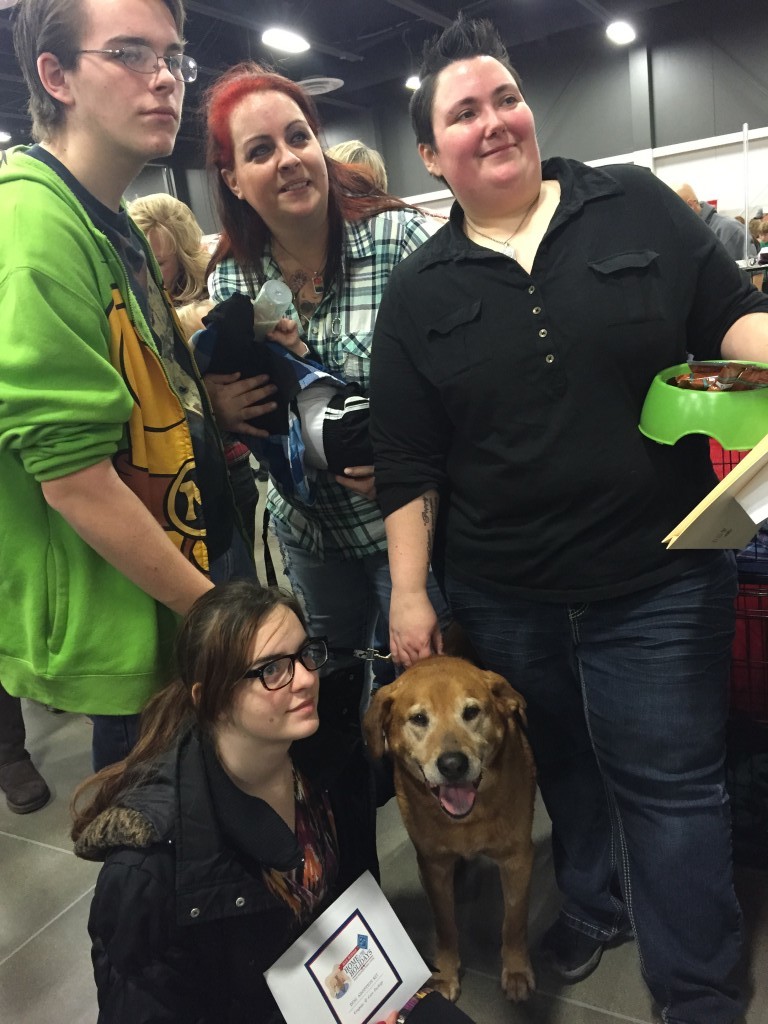We get it: puppies and kittens are The Cutest. But have you seen the faces of these two “seniors” who will be making their first appearance at this year’s My Furry Valentine? (Don’t worry, there will be plenty like them!)

Senior animals still have their good looks, but they also have something more: SOUL. And, they’re house-broken. And, most of them just want to cuddle near you all day, every day. But most importantly, senior animals are overlooked way too often, so bringing one of them home basically makes you a superhero.
Case in point: Meet Ripley. At 9 years old, and after two months in the shelter, Ripley found his furever family at our 2015 My Furry Valentine. The superhero capes on this family are basically flying off the photo.

Let’s get real though: it’s most important to find an adoptable animal that fits your lifestyle so once they come home with you, it’s for good. Here are some of the pros and cons of senior animals you should weigh (before you go ahead and bring one of these guys or gals home with you because, C’mon! You know you want to.)
PROS
- Usually house-broken (we can’t say this enough!)
- A good night’s sleep. No 4am pee calls, unless it’s for you 🙂
- Easier vet trips. Puppies, in particular, need lots of shots and checkups and are more likely to eat the thing they aren’t supposed to need. Senior dogs ain’t got time for that.
- What you see is what you get: large or small; active or couch potato; goofy or brilliant; sweet or sassy. While it’s true rescued animals will warm up over time and show different sides of themselves to you, there is less surprise with senior dogs.
- Instant companion. There’s no waiting for them to grow into their own. Your buddy is ready for you to bond – or not bond with if he’s a sassy cat – stat.
- True, deep, rescue bond. Those who have lost their families through death, divorce or lifestyle change go through a terrible mourning process. But, once attached to a new loving family, dogs especially, seem to want to please as much as possible to make sure they are never homeless again.
- Lots of senior pets are easily trained. Contrary to popular belief, you can often teach an old dog new tricks if you go about it properly. Older dogs’ attention spans are usually much longer than they’re younger counterparts.
CONS
- You’ll likely never know the true background or age of a senior dog or cat unless you get lucky.
- You will have fewer years together. But, you’ll be surprised how quickly you learn that the bond you develop will be worth all the time you do have, and the only story that matters is the one you’re now creating.
- In animals, as is true with humans, age is often accompanied by health problems such as diabetes, obesity, arthritis, liver problems, vision and/or hearing loss, even heart trouble are all possible. Treating or managing these will cost money. There is no guarantee your puppy will not encounter these same, or more serious health issues, as well so regardless be sure to plan for them.
- Your senior pet may have difficulty bonding with other animals in your home. Many rescues and shelters are willing to give you trial periods with any animal you want to take home to avoid these types of conflicts.
Remember, just because an older animal is in a shelter doesn’t mean something is wrong with him. Seniors may lose their home when their owner gets sick or passes away, and sadly, they are often turned in when a family decides they would rather have a younger animal instead. Allergies, new babies, moves…all reasons animals lose their homes. While it is heartbreaking to think of any animal in a shelter, picture a dog or cat losing the only family he has ever known and spending his golden years alone in a cage. No animal deserves this life.
When you’re visiting the rescues and shelters this year at My Furry Valentine, take another minute with the dogs and cats who may not be leaping to greet you. Ask the volunteers about their stories. Then sit down and give them some extra love. We bet if you give them a moment, they’ll be willing to give you a lifetime.
Tips for How to Extend Your Senior Dog’s Health
Lastly, if you do a take a senior dog home, it’s more important to get up to speed with what you can do to ensure a long and healthy life today. Check out these tips from Petfinder, which we’ve summarized below:
- Discuss your dog’s diet with your vet sooner than later.
- Keep your animal lean with exercise. It can literally add years to their life.
- Schedule regular checkups, so you don’t miss early signs that are more treatable.
- Don’t neglect your dog’s teeth, including regular cleanings at home and annual professional cleanings.




